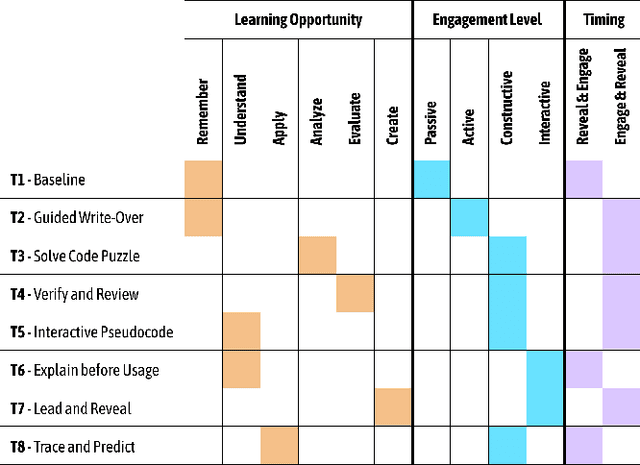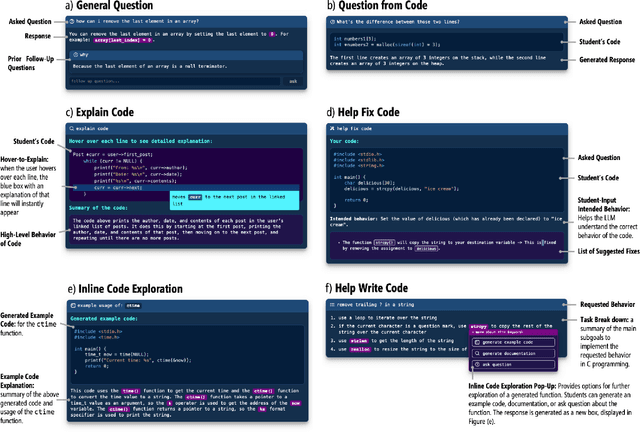Majeed Kazemitabaar
Improving Student-AI Interaction Through Pedagogical Prompting: An Example in Computer Science Education
Jun 23, 2025Abstract:With the proliferation of large language model (LLM) applications since 2022, their use in education has sparked both excitement and concern. Recent studies consistently highlight students' (mis)use of LLMs can hinder learning outcomes. This work aims to teach students how to effectively prompt LLMs to improve their learning. We first proposed pedagogical prompting, a theoretically-grounded new concept to elicit learning-oriented responses from LLMs. To move from concept design to a proof-of-concept learning intervention in real educational settings, we selected early undergraduate CS education (CS1/CS2) as the example context. We began with a formative survey study with instructors (N=36) teaching early-stage undergraduate-level CS courses to inform the instructional design based on classroom needs. Based on their insights, we designed and developed a learning intervention through an interactive system with scenario-based instruction to train pedagogical prompting skills. Finally, we evaluated its instructional effectiveness through a user study with CS novice students (N=22) using pre/post-tests. Through mixed methods analyses, our results indicate significant improvements in learners' LLM-based pedagogical help-seeking skills, along with positive attitudes toward the system and increased willingness to use pedagogical prompts in the future. Our contributions include (1) a theoretical framework of pedagogical prompting; (2) empirical insights into current instructor attitudes toward pedagogical prompting; and (3) a learning intervention design with an interactive learning tool and scenario-based instruction leading to promising results on teaching LLM-based help-seeking. Our approach is scalable for broader implementation in classrooms and has the potential to be integrated into tools like ChatGPT as an on-boarding experience to encourage learning-oriented use of generative AI.
Exploring the Design Space of Cognitive Engagement Techniques with AI-Generated Code for Enhanced Learning
Oct 11, 2024



Abstract:Novice programmers are increasingly relying on Large Language Models (LLMs) to generate code for learning programming concepts. However, this interaction can lead to superficial engagement, giving learners an illusion of learning and hindering skill development. To address this issue, we conducted a systematic design exploration to develop seven cognitive engagement techniques aimed at promoting deeper engagement with AI-generated code. In this paper, we describe our design process, the initial seven techniques and results from a between-subjects study (N=82). We then iteratively refined the top techniques and further evaluated them through a within-subjects study (N=42). We evaluate the friction each technique introduces, their effectiveness in helping learners apply concepts to isomorphic tasks without AI assistance, and their success in aligning learners' perceived and actual coding abilities. Ultimately, our results highlight the most effective technique: guiding learners through the step-by-step problem-solving process, where they engage in an interactive dialog with the AI, prompting what needs to be done at each stage before the corresponding code is revealed.
Improving Steering and Verification in AI-Assisted Data Analysis with Interactive Task Decomposition
Jul 02, 2024



Abstract:LLM-powered tools like ChatGPT Data Analysis, have the potential to help users tackle the challenging task of data analysis programming, which requires expertise in data processing, programming, and statistics. However, our formative study (n=15) uncovered serious challenges in verifying AI-generated results and steering the AI (i.e., guiding the AI system to produce the desired output). We developed two contrasting approaches to address these challenges. The first (Stepwise) decomposes the problem into step-by-step subgoals with pairs of editable assumptions and code until task completion, while the second (Phasewise) decomposes the entire problem into three editable, logical phases: structured input/output assumptions, execution plan, and code. A controlled, within-subjects experiment (n=18) compared these systems against a conversational baseline. Users reported significantly greater control with the Stepwise and Phasewise systems, and found intervention, correction, and verification easier, compared to the baseline. The results suggest design guidelines and trade-offs for AI-assisted data analysis tools.
CodeAid: Evaluating a Classroom Deployment of an LLM-based Programming Assistant that Balances Student and Educator Needs
Jan 20, 2024



Abstract:Timely, personalized feedback is essential for students learning programming, especially as class sizes expand. LLM-based tools like ChatGPT offer instant support, but reveal direct answers with code, which may hinder deep conceptual engagement. We developed CodeAid, an LLM-based programming assistant delivering helpful, technically correct responses, without revealing code solutions. For example, CodeAid can answer conceptual questions, generate pseudo-code with line-by-line explanations, and annotate student's incorrect code with fix suggestions. We deployed CodeAid in a programming class of 700 students for a 12-week semester. A thematic analysis of 8,000 usages of CodeAid was performed, further enriched by weekly surveys, and 22 student interviews. We then interviewed eight programming educators to gain further insights on CodeAid. Findings revealed students primarily used CodeAid for conceptual understanding and debugging, although a minority tried to obtain direct code. Educators appreciated CodeAid's educational approach, and expressed concerns about occasional incorrect feedback and students defaulting to ChatGPT.
 Add to Chrome
Add to Chrome Add to Firefox
Add to Firefox Add to Edge
Add to Edge